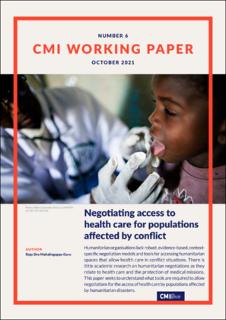Negotiating access to health care for populations affected by conflict
Original version
Bergen: Chr. Michelsen Institute (CMI Working Paper WP 2021:6) 20 p.Abstract
Abstract This Working Paper seeks to understand the tools required to allow negotiations for the access of health care by populations affected by humanitarian disasters. A review of theoretical knowledge about health negotiations together with resource materials relating to negotiation and document analysis found that humanitarian organisations lack robust, evidence-based, context-specific negotiation models and tools for accessing humanitarian spaces that allow health care in conflict situations. There is little academic research on humanitarian negotiations as they relate to health care and the protection of medical missions. However, humanitarian organisations have begun to realise the importance of humanitarian negotiations and the use of diplomacy in conflict situations and are beginning to forge partnerships with like-minded organisations, including academic institutions and think-tank groups in order to develop appropriate negotiation tools and methods. They are also establishing peer networks and training frontline humanitarian staff to address the needs of those staff and their organisations. The tools they are using, though, are based on resource materials specific to other fields. The Naivasha Grid offers a systematic and useful guide for enhancing negotiations for health care access in crisis settings. This publication is part of the project “Humanitarian Diplomacy: Assessing Policies, Practices and Impact of New Forms of Humanitarian Action and Foreign Policy” funded by the Research Council of Norway (project number 286859) and led by Antonio De Lauri at the Chr. Michelsen Institute.
Publisher
Chr. Michelsen InstituteSeries
CMI Working Paper WP 2021:6CMI Working Paper WP 2021:6
